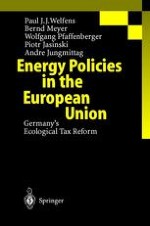2001 | OriginalPaper | Buchkapitel
Optimal Ecological Tax Reform: Options and Recommendations for an EU-Action Plan
verfasst von : Prof. Dr. Paul J. J. Welfens, Prof. Dr. Bernd Meyer, Prof. Dr. Wolfgang Pfaffenberger, Piotr Jasinski, Dr. Andre Jungmittag
Erschienen in: Energy Policies in the European Union
Verlag: Springer Berlin Heidelberg
Enthalten in: Professional Book Archive
Aktivieren Sie unsere intelligente Suche, um passende Fachinhalte oder Patente zu finden.
Wählen Sie Textabschnitte aus um mit Künstlicher Intelligenz passenden Patente zu finden. powered by
Markieren Sie Textabschnitte, um KI-gestützt weitere passende Inhalte zu finden. powered by
An ecological tax reform should bring a true double dividend, namely reduced emissions and higher employment. For several EU countries with high unemployment problems and high labour taxes the option of an ecological tax reform offers some prospect for a double dividend. This holds, however, only if nuclear energy is not artificially subsidized as is still the case in most OECD countries with nuclear energy — not facing the true cost of nuclear energy generation as energy generators face only limited liability (i.e. pay no full insurance) and as nuclear waste storage costs and risks are only partly covered. Only Sweden decided to introduce a special nuclear fuel levy in 1999. Another caveat concerns the expected output reduction in the context of a pure ecological tax reform. The negative output effect can, however, be avoided if government devotes a certain share of ecological tax revenue to growth-enhancing measures where higher R&D promotion is particularly relevant for EU countries, possibly except for Sweden which already has achieved a relatively high R&D-GDP ratio.
